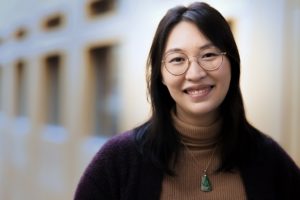Amanda Giang is an Assistant Professor in the Institute for Resources, Environment and Sustainability and the Department of Mechanical Engineering at the University of British Columbia Vancouver campus, on the traditional, ancestral and unceded territory of the Musqueam People. Her research group addresses environmental policy analysis challenges through an interdisciplinary lens, with a focus on pollution, climate, and energy. Key topics of current interest include developing better tools and methods for assessing and addressing air pollution and environmental injustice in Canada, understanding the links between air quality and decarbonization to inform policy and planning decisions, and understanding the combined impacts of global change drivers on contaminant cycling and exposure. She currently serves on the Early Career Editorial Advisory Board for Environmental Science & Technology, and the Editorial Board of Environmental Research Communications. She received a PhD and MS in Engineering Systems and Technology Policy at MIT, and a BASc in Engineering Science from the University of Toronto.
Read Amanda’s Emerging Investigator Series article “Investigating the dynamics of methylmercury bioaccumulation in the Beaufort Sea Shelf food web: a modeling perspective” and read more about her in the interview below:
Your recent Emerging Investigator Series paper focuses on Investigating the dynamics of methylmercury bioaccumulation in the Beaufort Sea Shelf food web: a modeling perspective. How has your research evolved from your first article to this most recent article?
My first experience in research as an undergraduate student was related to characterizing chemical contaminants in the urban environment. That experience really piqued my interest in environmental determinants of human health and well-being, as well as the role of technology and infrastructure. This motivated me to do my graduate studies at the intersection of engineering, public policy, and the environment. My first lead-authored paper was about tracing through what new global mercury policy might mean for changes in technology and emissions, and therefore changes in environmental fluxes and concentrations of mercury. Since then, my research has continued to focus on this idea of trying to link sources of contaminants to their impacts, to inform the design of interventions—whether that’s in the form of changes to technology, policy, or behaviour. What has grown over time is the range of pollutants and impacts I explore, including air and climate pollutants, and impacts to ecosystems, human health and well-being, equity and justice. This most recent article is definitely an example of that evolution: with Dr. Mi-Ling Li and collaborators, we develop an ecosystem-based mercury bioaccumulation model, that we hope can be used to investigate the impacts of human activity and global environmental change on Arctic ecosystems and communities.
What aspect of your work are you most excited about at the moment?
At the moment, what energizes me the most are opportunities to collaborate across disciplines and with partners in government, civil society, and communities. Working in teams on problem-focused inquiry that supports environmental policy, planning, and stewardship decisions is what motivates to do research. And, on a personal level, it’s also just a lot of fun—through these collaborations, I’m constantly learning and being introduced to different ways of thinking and understanding the world. Often these connections are made through students and post-docs who come from different training backgrounds from my own. This article is a great example of the kind of collaborative work that’s really exciting me right now!
In your opinion, what are the most important questions to be asked/answered in this field of research?
I think key areas for more research are cumulative exposures to, and cumulative impacts of, multiple chemical and non-chemical stressors on human health and well-being. Not only are people exposed to multiple chemicals at the same time, in complex mixtures, but they often simultaneously experience other environmental (say during a climate disaster) and social stressors (such as poverty and other systemic inequities). Cumulative impacts have been identified as an important area for further research for some time now, in particular by communities experiencing heavy cumulative burdens, but I think there has not been as much progress as there needs to be in our communities of research and practice, to increase our understanding of these complex challenges and incorporate that understanding into policy changes.
What do you find most challenging about your research?
As an early career faculty member, I have to admit that one of the things that I have found a bit challenging is learning to manage larger, complex, research projects with many trainees, collaborators and partners. Collaborative, interdisciplinary research is one of the aspects of my research that I find most exciting, but which also requires learning some new skills! This includes creating space for discussing different goals, priorities, approaches, timelines and constraints, and also just the logistical aspects of coordination! Ultimately though, this complexity and diversity is also what makes the research so enriching and meaningful.
In which upcoming conferences or events may our readers meet you?
I plan on attending the American Geophysical Union Fall Conference in-person this year! Other conferences I try to go to include the Society for Environmental Toxicology and Chemistry, and International Society for Exposure Science, and American Chemical Society.
How do you spend your spare time?
I am a bit of a pop culture nerd, so I spend much of my spare time watching, listening, reading any and everything. I am also newly interested in birding!
Which profession would you choose if you were not a scientist?
Related to the above, my non-scientist dream job might be TV critic? I also have several academia-related pitches for series, on the very remote chance that someone from a streaming service is reading this.
Can you share one piece of career-related advice or wisdom with other early career scientists?
When I think of what sustains me in this career, it’s really relationships. I’m learning that taking the time to care for and nurture these relationships—with peers, with mentors, with trainees, with research partners and collaborators—is so important not only for my research and professional growth, but for my happiness.











